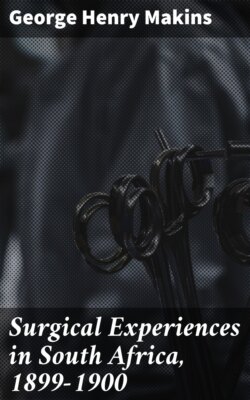Читать книгу Surgical Experiences in South Africa, 1899-1900 - George Henry Makins - Страница 15
На сайте Литреса книга снята с продажи.
Showing Proportion of Mortality amongst Men Hit, (a) on the Field, (b) during the First Forty-eight Hours
Оглавление| Percentage mortality | |||||||
| Number of troops engaged | Total number of men hit | Killed | Died within forty-eight hours | Total | To men hit | To force employed | |
| Belmont: | |||||||
| Officers | 297 | 26 | 3 | 3 | 6 | 23 | 2.02 |
| Non.-com. officers and men | 8,396 | 265 | 55 | 8 | 63 | 23.77 | 0.75 |
| Total | 8,693 | 291 | 58 | 11 | 69 | 23.71 | 0.79 |
| Graspan: | |||||||
| Officers | 326 | 10 | 3 | 1 | 4 | 40[2] | 1.22 |
| Non.-com. officers and men | 8,213 | 188 | 18 | 3 | 21 | 11.17 | 0.25 |
| Total | 8,539 | 198 | 21 | 4 | 25 | 12.62 | 0.29 |
| Modder River: | |||||||
| Officers | 335 | 22 | 3 | 1 | 4 | 18.18 | 1.19 |
| Non.-com. officers and men | 9,856 | 462 | 67 | 9 | 76 | 16.45 | 0.77 |
| Total | 10,191 | 484 | 70 | 10 | 80 | 16.53 | 0.78 |
| Magersfontein: | |||||||
| Officers | 379 | 68 | 18 | 4 | 22 | 32.35 | 5.80 |
| Non.-com. officers and men | 11,068 | 918 | 148 | 20 | 168 | 18.30 | 1.51 |
| Total | 11,447 | 986 | 166 | 24 | 190 | 19.26 | 1.66 |
The high death rate among the officers will at once arrest attention, but this has been noticed in other campaigns, particularly in the Franco-German war. It is mainly attributable to the circumstance that the officers, as leading, are always in the front and most exposed position. I much doubt whether at the end of the campaign the entire abandonment of distinctive badges will be found to have had any very important result in decreasing the relative number of casualties as between officers and men. At close quarters distinctive uniform is no doubt a danger, but at the common ranges of 1,000 yards and upwards the enemy's fire is rather directed to cover a zone than to pick out individuals.
The especially high mortality among the officers at the battle of Graspan was attributable to the casualties among the naval officers, and the men of the brigade suffered most severely also.
It will be noted that the most expensive battles were those of Belmont and Magersfontein.
If the numbers of the men actually taking part in the fighting in these battles as given in Table I. are massed, we get an approximate total of 12,420.[3]
Of this number, 1,959 or 15.06 per cent. were reported as killed, wounded, or missing. Thus: killed, 315 or 2.53 per cent.; wounded, 1,512 or 12.17 per cent.; missing, 132 or 1.06 per cent. Reference to Table III. shows that these percentages almost exactly correspond with those obtaining in the entire Crimean campaign, and are greater than those observed in the German army during the entire Franco-German campaign.
The mortality statistics given in Table II. are of great interest, since to those dying on the field are added all men dying within the first 48 hours in the Field hospitals. From the surgical point of view these men all received mortal injury, and are therefore properly included among the fatalities. Their inclusion, moreover, makes an appreciable difference in the percentage proportion of mortal injuries to wounds. Thus, if the numbers are massed (omitting the 'missing'), we find that in the four battles 1,827 men were hit, of whom 315, or 17.24 per cent., were killed. Among the wounded carried off the field, however, 49 received mortal injuries, and if these are added to the 315, we find that the proportion of mortal injuries reaches 19.92 per cent.
